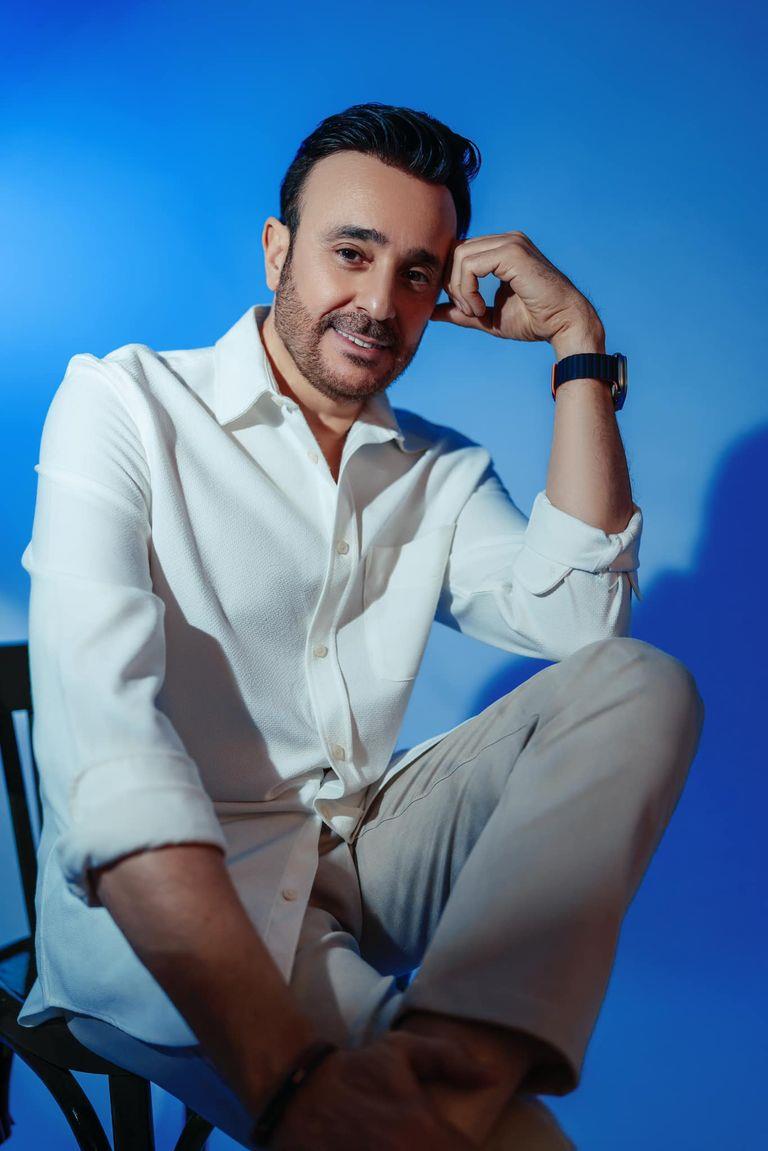
A Sincere Song Never Dies: Saber Rebai
Blending authenticity with innovation, Rebai continues to stand out as an artist whose melodious voice bridges past and present. In this conversation, the Tunisian star reflects on his latest songs, the challenges of today's music scene, his enduring bond with audiences, and the secrets behind a career that remains as vibrant as ever.
This summer has been a whirlwind for you, with concerts across Tunisia, Egypt, Lebanon, Morocco, and Iraq. How do you view this intense tour?
I'm truly overjoyed. These concerts allowed me to be close to my fans across multiple Arab countries. Each concert had its own atmosphere and message, and I was keen to present a carefully curated mix to satisfy all tastes. The audience filled me with immense positive energy-and that energy is the real secret to my longevity.
Your recent release“ Makhzoun Al-Saada” was warmly received. What does this song represent for you?
It's full of positive energy. Written by Amr Al-Masry, composed by Amr Al-Shazly, and arranged by Amr Al-Khodary with Hassan Said's ensemble, the song was my way of gifting joy to the audience. Summer always calls for light, cheerful music.
Your song El-Basha also sparked wide attention. What drew you to it?
It's a lighthearted song, very different from my usual style, but it resonated because of its Egyptian dialect and everyday expressions. When Mahmoud El-Khayami shared the idea, I was immediately intrigued. In the track,“El-Basha” refers to the heroine, but I also believe every artist who brings something genuine deserves to be called a“Pasha” in their field.
In your view, what makes a song timeless?
Sincerity, above all. When heartfelt lyrics meet the right melody and the arrangement serves the text rather than overshadowing it, the song speaks directly to the soul. Times and tastes change, but a sincere song never dies.
Your classic“ Sidi Mansour” was recently named among the top 50 songs of the 21st century in the Arab world. How did you receive this recognition?
With immense pride. The song is rooted in Tunisian folklore, but presenting it in a modern spirit made it more accessible. For a global publication like Rolling Stone to honour it is a privilege. I hope this also shines more light on Tunisian musical heritage.
Audiences connect deeply with your dramatic songs. How do you balance that with lighter music?
Dramatic songs allow for vocal and emotional depth, but I always aim for balance. Audiences also need lighthearted, rhythmic tracks. Diversity is part of an artist's responsibility.
How do you choose your concert setlists?
Some songs are non-negotiable-Sidi Mansour, Bebasata, Barsha. But I adapt to the venue: the Cairo Opera House expects classical tarab, while summer festivals call for upbeat, rhythmic music. Each stage has its own character.
Is success harder to achieve today than before?
Absolutely. Today, quantity often overshadows quality. Social media makes exposure easy, but many artists go viral with one song then disappear because they lack vision. Success requires a plan, a rich journey, and accountability-not excuses.
You've shifted from albums to singles. Why?
Listeners today won't wait two years for an album. Songs are consumed quickly, so I prefer releasing a single every couple of months to stay present. Later, I might compile them into an album.
How do you view today's music scene, where quick hits dominate streaming?
Sadly, volume often trumps artistry. Many songs are created for instant buzz without substance. But audiences crave sincerity. True art isn't measured by view counts-it's measured by impact.
You were once a fixture on talent shows, but their shine has faded. Why?
Because most contestants aren't supported after the show ends. That erodes trust. Yet these platforms have produced talents like Carmen Suleiman, Mohammed Assaf, and Melhem Zein. The key is continuity through production and mentorship.
Your collaboration with Ali Al-Moula is one of the longest-running in the industry. What's the secret?
Ali is no longer just a manager-he's a partner in both success and struggle, and a close family friend. We share a deep understanding that goes beyond work.
You're highly active on social media. How do you handle its pros and cons?
It's essential for connecting with fans, but it also invites rumours and invades privacy. I try to take the best from it while protecting myself from its downsides.
What's your view on Fadel Chaker's return?
It's a true gain for Arabic music. His recent heartfelt songs restored much-needed balance to a scene that has been overwhelmed by fleeting trends.
You posted a public thank-you to him. What was your message?
That audiences don't want shallow music. They crave depth. That's why I wrote:“Thank you, Fadel Chaker, and your entire team. You have restored balance to Arabic music.” The claim that“audiences only want this” is false-they want sincerity.
Sherine Abdel-Wahab recently returned after personal struggles. How do you see her comeback?
Sherine is exceptional, both as an artist and as a person. No matter how long she's away, she remains a fixture among Arab singers. Today, she's more vibrant, making bold choices. Her voice is a gift we truly need.
And the controversy around actress Hend Sabry?
You can't reduce Hend Sabry to a single rumour. She is married to an Egyptian, her children were born here, and she holds citizenship. She's also a goodwill ambassador and invested in humanitarian causes. The criticism she faced was illogical and unfair.
Finally, what's next for you?
A series of singles, released one after the other, and a tour that will take me to Egypt, Lebanon, Tunisia, Kuwait, and Cyprus. Above all, I hope to keep living up to my audience's trust and delivering music that stays in their hearts.

Legal Disclaimer:
MENAFN provides the
information “as is” without warranty of any kind. We do not accept
any responsibility or liability for the accuracy, content, images,
videos, licenses, completeness, legality, or reliability of the information
contained in this article. If you have any complaints or copyright
issues related to this article, kindly contact the provider above.




















Comments
No comment